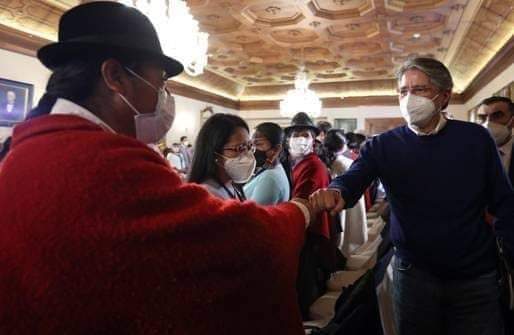The Ecuadorian government and its main Indigenous group reached an agreement to stop 18 days of violent strikes that nearly paralyzed the country.
QUITO (Ecuador) -- The Ecuadorian government and its main Indigenous group reached an agreement on Thursday to stop 18 days of violent strikes that nearly paralyzed Ecuador and left at least four dead.
The agreement, which includes a reduction in fuel prices and other concessions was signed by Francisco Jimenez (Government Minister), Leonidas Iza, Indigenous leader, and Monsignor Luis Cabrera (head of the Episcopal Conference), who served as mediator.
According to the agreement, gasoline prices will drop 15 cents to $2.40/gallon while diesel prices will fall the same amount from $1.90 to $1.75.
This agreement also limits the expansion of oil exploration and prohibits mining in protected areas, national park and water resources.
The government has now been given 90 days to respond to the Indigenous groups' demands.

Cabrera stated that social peace can only be achieved through dialogue, with particular attention to marginalized communities and respect for everyone's rights.
He warned that "if the state does not solve the problem of the poor", then the people would rise up.
Jimenez stated that "We know we have an unstable country, with many divisions and a lot more problems than good, with large segments of the population still marginalized,"
On Monday, negotiations had begun between the two sides. An agreement seemed to be in reach until an attack by Indigenous people on a fuel convoy left one dead and 12 wounded. The government then abandoned talks.
Four deaths have been directly attributed by authorities to the 18-day strike.
On June 13, the Confederation of Indigenous Nationalities launched an indefinite strike demanding a reduction in fuel prices, an increase in the education and health budgets, as well as price control on certain goods.
The two sides reached an agreement to begin negotiations amid increasing shortages of fuel and food , as well as millions of losses for farmers.
Strenuous road blocks that stopped fuel, food and ambulance transport were a hallmark of the protests. The result was a sharp rise in the cost of food that did reach cities, especially in the Andean North, which has been the most affected area by the strike.